Negation(正说反译、反说正译)
- 格式:doc
- 大小:51.50 KB
- 文档页数:8

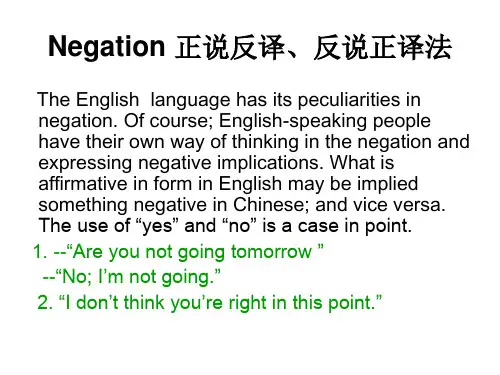
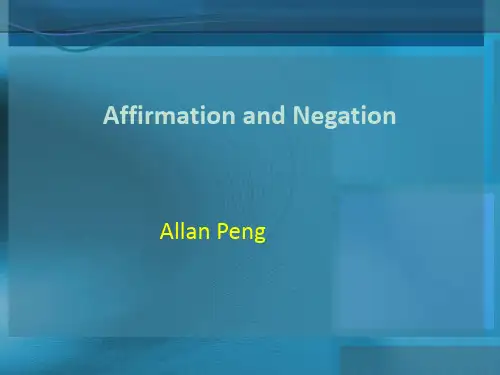
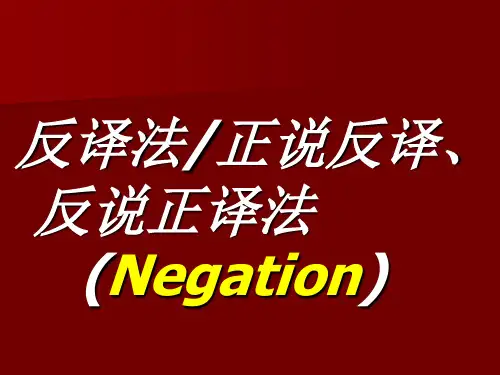
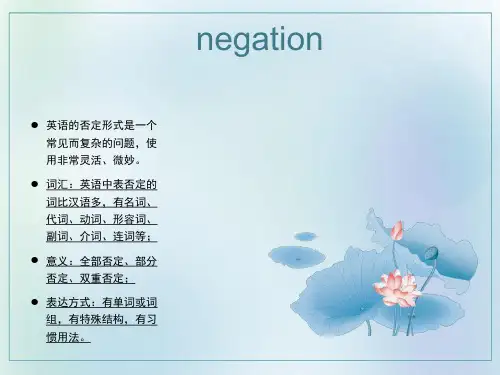
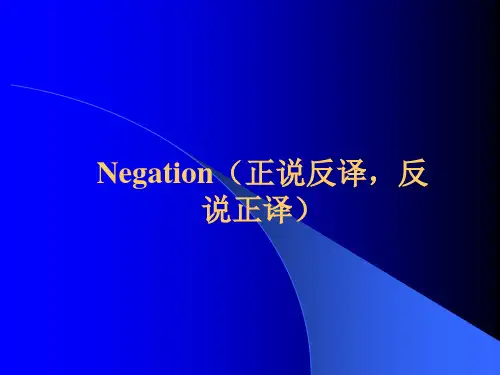
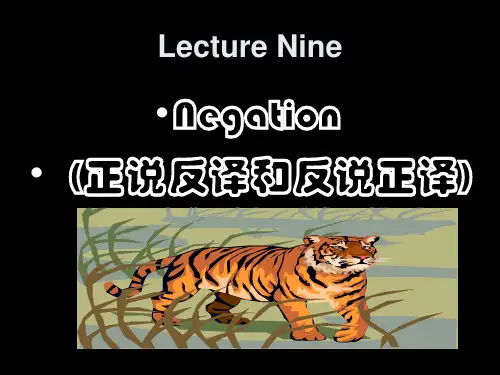
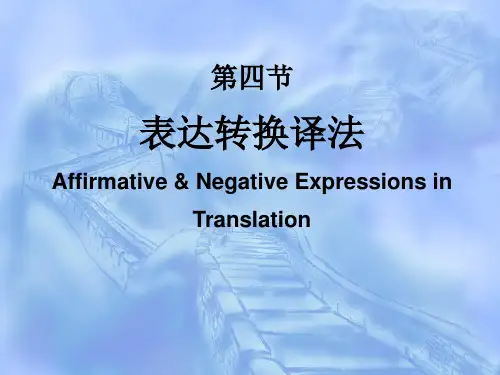
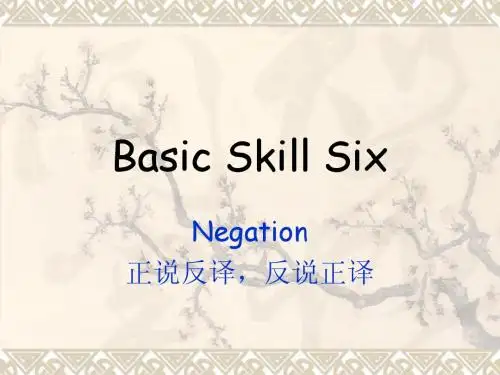
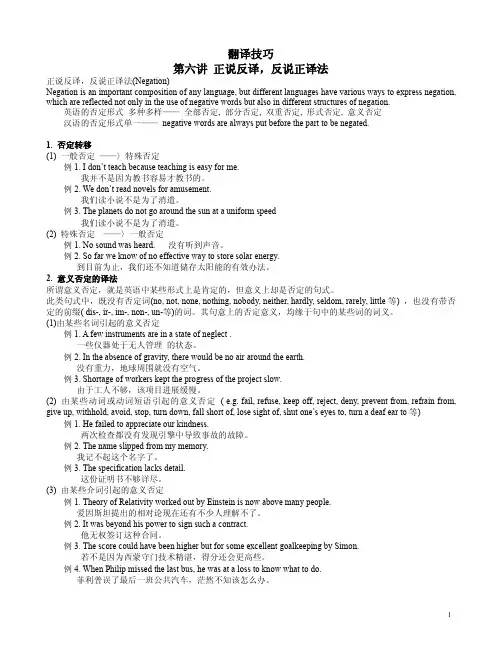
翻译技巧第六讲正说反译,反说正译法正说反译,反说正译法(Negation)Negation is an important composition of any language,but different languages have various ways to express negation, which are reflected not only in the use of negative words but also in different structures of negation.英语的否定形式多种多样——全部否定,部分否定,双重否定,形式否定,意义否定汉语的否定形式单一——negative words are always put before the part to be negated.1.否定转移(1)一般否定——〉特殊否定例1.I don’t teach because teaching is easy for me.我并不是因为教书容易才教书的。
例2.We don’t read novels for amusement.我们读小说不是为了消遣。
例3.The planets do not go around the sun at a uniform speed我们读小说不是为了消遣。
(2)特殊否定——〉一般否定例1.No sound was heard.没有听到声音。
例2.So far we know of no effective way to store solar energy.到目前为止,我们还不知道储存太阳能的有效办法。
2.意义否定的译法所谓意义否定,就是英语中某些形式上是肯定的,但意义上却是否定的句式。
此类句式中,既没有否定词(no,not,none,nothing,nobody,neither,hardly,seldom,rarely,little等),也没有带否定的前缀(dis-,ir-,im-,non-,un-等)的词。
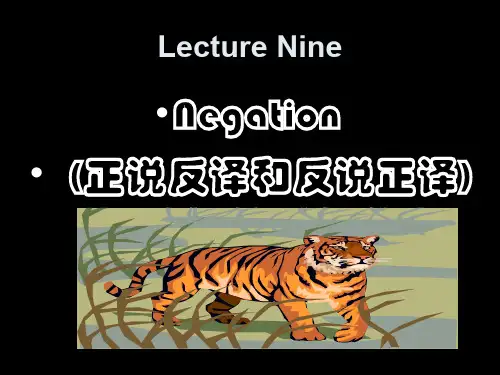
翻译常用的八种技巧一、常用的翻译技巧1. 重复法(repetition)2. 增译法(amplification)3. 减译法(omission)4. 词类转移法(conversion)5. 词序调整法(inversion)6. 分译法(division)7. 正说反译, 反说正译法(negation)8. 语态变换法(the change of the voices)1. 重复法汉语重复,英译时也重复;根据两种语言各自的习惯用法,以不同的表达方式进行重复,这种重复通常是为了传达原文的生动性.We have to analyze and solve problems.我们要分析问题,解决问题。
Let’s revise our safety and sanitary regulations.我们来修改安全规则和卫生规则吧。
Gentlemen may cry, peace, peace --- but there is no peace.先生们尽管可以高呼和平,和平!但是依然没有和平。
Nels had it all written out neatly.纳尔斯把它写得清清楚楚。
青青河边草, 郁郁园中柳。
Green grows the grass upon the bank,The willow shoots are long and lank.2. 增译法为了使译文忠实地表达原文的意思与风格并使译文合乎表达习惯,必须增加一些词语,这就叫增译法.增词义增加虚词为多,也可酌量增加实词。
英译汉时经常增加的词有结构词、数量词、概念词、语气词等。
从增补的功能来看,可以分为结构增补、意义增补和修辞增补。
I am looking forward to the holidays.我们等待假日的到来。
Much of our morality is customary.我们大部分的道德观念都有习惯性。
Reading makes a full man; conference a ready man; and writing an exact man.读书使人充实,讨论使人机智,笔记使人精确。
翻译就这七个字翻译技巧可以概括为七个字:“分”、“合”、“加”、“减”、“转”、“调”和“反”。
简称“七字诀”。
1). Division 分句法2). Merge 合句法3) Amplification 增译法增词法4) Omission 减译法省略法5) Conversion 词类转换法转换6).Inversion 词序调整法位置调整7).Negation 正说反译,反说正译可以这样理解:1.分译4=2+2 一分为二2.合译2+2=4 合二为一3.加词2+2=2 加词不加意4.减词2-2=2 减词不减意5.转换2+2=3+1 变换符号不变换意思6.调整1+2=2+1 前后移位7. 反译1+2=-(-1-2)反着译一. 所谓“分”即为“分译”。
又称为:“分句法”,是指把原文中的一个词或一个短语扩展成一个句子。
这个词或短语虽然从语法上分析只说明某句子成分。
但从逻辑意义上看说明整个句子,起着相当于一个并列分句或者一个状语从句的作用。
例如:The Chinese seemed justifiable proud of their economic achievements.中国人似乎为他们在经济上的成就而自豪,这是合乎情理的。
Y ou will soon be amply rewarded for your help.你将很快获得重奖,因为你乐于助人。
But another round of war in the region clearly would put strains on the international relations.但是,如果该地区再次发生战争,国际关系显然会紧张起来。
A gang of men, under the direction of their energetic and likeable foreman, 25-year-old Phineas P. Gage, was working on a new line of the Rutland and Burlington railroad.一伙工人正跟着他们的领班在拉特兰-伯灵顿铁路的新线路上干活。
Translation concerning negationAims: to understand the features of Chinese and English as regards negation, the application of negation in the process of translationKey points: the application of negation in the process of translationDifficulties: affirmative 肯定in Chinese but negative in English, negative in Chinese but affirmative in EnglishTeaching procedures:Negation being an important conception in one’s expression of thoughts, expressions of negations is to be found in any tongue. This is naturally true of Chinese and English. However, the ways of indicating negation are quite different in the two languages. This frequently causes a lot of trouble to translators, who if not careful enough, would often make mistakes.1. Features of the two languages as regards negation●1. Both languages have negatives or expressions formed with negatives. In modern Chinese, the much-used negative words are: 不,没,别. These words express three different meanings: 不signifies表示denial of a statement;没denial of a being or occurrence(,非and 否can be put under this category);别dissuasion or prohibition(甭,勿,and 莫can be put under this category)●The oft-used negatives in English are “not”, and “no”, in addition to “nothing”, ”nobody” “none”, “without”, “ neither…nor”, “never”, etc.●Chinese negatives are generally capable of producing derivatives, particularly the word 不, 无and 非. Their derivatives are equivalent to English words formed by adding affixes, e.g. 不法unlawful, 不便inconvenient, 无边boundless,非正规军irregulars●In English, apart from using negatives to express negation, words with a negative sense can be formed by adding affixes to roo t words. The affixes thus used are mainly “less”suffix “un” “in”, and “non”●However, English words formed with affixes with a negative, while adjective and nouns formed with “un” such as “unavoidable” and “unbelief” are negative, for instance, verbs forme d with affixes such as “unclasp” and “uncork” affirmative.●In Chinese, words formed with negatives are generally negative in sense but in some cases they assume new meaning like 非常, which practically means 很.●In English, the same word formed with a different affix differs in meaning (compare discord with uncord). Sometimes, words formed with different affixes 词缀with a negative sense would produce words with different implications含义---derogatory贬义and the other non-derogatory褒义. For instance, immoral means 不道德,and is therefore derogatory while unmoral means 非道德,无道德观念的,and is therefore non derogatory. 1.W arm-up exercises2.I don't’ think Tom is correct.3.I don’t think Xiaoming is coming tomorrow.4.A re you not going tomorrow?---- No, I am not going .5.A frica is not kicking out W estern imperialism in order to invite other new masters.6.T he world today is far from peaceful.7.O ur PLA is worthy of being called a great army of the people.8.H e tried his best to overcome the lack of technical data.9.T he window refused to open.10.Y esterday he failed to get to school on time.11.They excluded children from getting in.12.The building is in a state of neglect.13.He is often absent- minded.14.To do this is beyond me.15.Lei Feng’s noble deeds are above all praise.16.I, rather than you , should do the work.17.The truth is quite other than what you think.18.She refrained from laughing.19.She was refused admitance by them.20.An opportunity is not likely to repeat itself.21.Live up to the expectations of our own people and the people throughout the world.22.Slips are scarely avoidable when you are new to your work.23.The meetings were marked by such an absence of lively discussions that at times they were almost on the piont of breaking up.24.Avoid operating the keys roughly.25.The scientists made a solemn plege at the conference, saying, “W e’ll forever live up to what our Party expecs of us.”26.The evidence is conclusive, excluding all possibilities of doubt.27.That fellow is far from being honest.28.Luan Ping stood still, trying vainly (in vain) to answer the battery of questions Y ang Zirong raised.29.That served to strenghen instead of weaken our determination.30.But for their help. W e should not succeeded in this experiment.31.All that glitters is not gold.32.All is not lost.33.All criminals are murderers.34.But aal men are born to reign.35.All that flatter you too much are not faithful friends.36.Both children are not clever.37.W e never thought of nothing wrong.我们从来没有想到有什么错误。